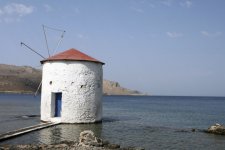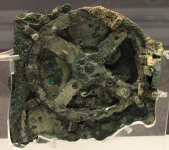Menu
Install the app
How to install the app on iOS
Follow along with the video below to see how to install our site as a web app on your home screen.
Note: This feature may not be available in some browsers.
You are using an out of date browser. It may not display this or other websites correctly.
You should upgrade or use an alternative browser.
You should upgrade or use an alternative browser.
1 - 11 of 11 Posts
My favorite invention that the ancient Greeks created is democracy! 

efhernandez_
Active member
Woah...I can't believe they have the original one, so coolOk, as an engineer, especially one that is particularly interested in computers, my favourite invention is the Antikythera mechanism which is on display in the National Archaeological Museum in Athens.
View attachment 775
Blue & White
Member
Avgolemono soup
francescool
Active member
The fire pump!!
k_tsoukalas
Administrator
Yess!! It's the best, so good.Avgolemono soup
The Antikythera Mechanism is also a truly remarkable invention.
I didn't know Greeks invented the windmill? I do know that some of my best photographs taken in Greece have involved windmills.
Blue & White
Member
The Greeks invented everything, directly or indirectlyYess!! It's the best, so good.
The Antikythera Mechanism is also a truly remarkable invention.
I didn't know Greeks invented the windmill? I do know that some of my best photographs taken in Greece have involved windmills.
nm1999
Active member
True!The Greeks invented everything, directly or indirectly
Vangelis
Active member
For those interested in Ancient Greek inventions, the Museum of Ancient Greek Technology in Athens is a great place to visit.
 kotsanas.com
kotsanas.com
Museum of the Ancient Greek Technology
 kotsanas.com
kotsanas.com
nm1999
Active member
Looks great, thanks for sharingFor those interested in Ancient Greek inventions, the Museum of Ancient Greek Technology in Athens is a great place to visit.
Museum of the Ancient Greek Technology
kotsanas.com
1 - 11 of 11 Posts
JOIN THE DISCUSSION AND READ OTHER GREEK INFO:
Learning about the Spartan way of life
- dimi_pat
- Greek History Forum
- Replies: 1
I find the Spartans fascinating. They seemed to have a different way of life!
The Spartans, known for their military might, also led a lifestyle that was remarkably disciplined and focused on simplicity.
The core of Spartan society was its military-oriented ethos. From a young age, Spartan boys were trained to be soldiers in the agoge, a rigorous education system that emphasized physical training, endurance, and survival skills. This preparation was not just about warfare but about creating individuals who were resilient, self-sufficient, and disciplined.
But Spartan discipline extended beyond the military sphere. Spartans lived a life of austerity and frugality that is quite alien to our modern way of living. Meals were simple, homes were unadorned, and luxuries were frowned upon. This was not out of a lack of resources but a deliberate choice to avoid softness and dependency on material comforts.
Interestingly, this Spartan simplicity also fostered a sense of equality among citizens. By eschewing luxury, Spartans aimed to reduce divisions within their society. Wealth and status were downplayed, while military prowess and moral integrity were valued above all.
What do you guys think about this or what can you add to my thinking?
The Spartans, known for their military might, also led a lifestyle that was remarkably disciplined and focused on simplicity.
The core of Spartan society was its military-oriented ethos. From a young age, Spartan boys were trained to be soldiers in the agoge, a rigorous education system that emphasized physical training, endurance, and survival skills. This preparation was not just about warfare but about creating individuals who were resilient, self-sufficient, and disciplined.
But Spartan discipline extended beyond the military sphere. Spartans lived a life of austerity and frugality that is quite alien to our modern way of living. Meals were simple, homes were unadorned, and luxuries were frowned upon. This was not out of a lack of resources but a deliberate choice to avoid softness and dependency on material comforts.
Interestingly, this Spartan simplicity also fostered a sense of equality among citizens. By eschewing luxury, Spartans aimed to reduce divisions within their society. Wealth and status were downplayed, while military prowess and moral integrity were valued above all.
What do you guys think about this or what can you add to my thinking?
Family Trees
- Rízes Hellenic Genealogy
- Greek History Forum
- Replies: 0
Hey fellow members,
As we traverse the rich tapestry of Greek culture and history on this platform, I've been pondering something quite fascinating: our family histories. How many of us have delved into the intricate branches of our family trees?
Genealogy, the study of family history and lineage, often unveils captivating stories, connections, and traditions passed down through generations. Whether you're just beginning to trace your ancestry or have been meticulously documenting it for years, I'd love to hear about your experiences.
Here are a few questions to spark our discussion:
Looking forward to our discussion,
RizeGen
As we traverse the rich tapestry of Greek culture and history on this platform, I've been pondering something quite fascinating: our family histories. How many of us have delved into the intricate branches of our family trees?
Genealogy, the study of family history and lineage, often unveils captivating stories, connections, and traditions passed down through generations. Whether you're just beginning to trace your ancestry or have been meticulously documenting it for years, I'd love to hear about your experiences.
Here are a few questions to spark our discussion:
- What inspired you to start researching your family history?
- Have you encountered any unexpected discoveries or fascinating tales along the way?
- What resources or tools have you found most helpful in your genealogical journey?
- Do you have any tips or advice for someone interested in starting their own family tree?
Looking forward to our discussion,
RizeGen
Studying the Trojan War - Was it Real?
- d_kakavouli
- Greek History Forum
- Replies: 1
Did the Trojan War really happen? I am doing a bit of research and wanted to know what you guys thought:
The war is believed to have happened around 1200 BCE, and while there is no concrete evidence to support its occurrence, it is widely accepted as factual.
What is confusing me is how prevalent it is in Greek Mythology. In addition to the gods' involvement in the conflict, various stories and legends were added over time to give the tale more depth and drama. For example, the character of Achilles was said to be invulnerable except for his heel, which led to the phrase "Achilles heel" being used to describe a person's one weakness.
While some scholars once dismissed the Trojan War as pure myth, modern archaeological evidence has suggested that it may have been a real event. Excavations at the ancient site of Troy have revealed evidence of a long period of conflict and destruction, and historians have found similarities between the tale as it is told in ancient texts and what is known about the region's history at the time. While many details of the Trojan War are still shrouded in mystery, it seems increasingly likely that it was not just a legend but a real event that has been passed down through the ages.
The war is believed to have happened around 1200 BCE, and while there is no concrete evidence to support its occurrence, it is widely accepted as factual.
What is confusing me is how prevalent it is in Greek Mythology. In addition to the gods' involvement in the conflict, various stories and legends were added over time to give the tale more depth and drama. For example, the character of Achilles was said to be invulnerable except for his heel, which led to the phrase "Achilles heel" being used to describe a person's one weakness.
While some scholars once dismissed the Trojan War as pure myth, modern archaeological evidence has suggested that it may have been a real event. Excavations at the ancient site of Troy have revealed evidence of a long period of conflict and destruction, and historians have found similarities between the tale as it is told in ancient texts and what is known about the region's history at the time. While many details of the Trojan War are still shrouded in mystery, it seems increasingly likely that it was not just a legend but a real event that has been passed down through the ages.
Athens and the creation of democracy
- mastichas09
- Greek History Forum
- Replies: 1
I've been thinking about Athens and how it's the birth of democracy. I wondered if other societies had experimented with the concepts or if Athens was unique? Does anyone know? I know that there's been some evidence that other societies experimented with community leadership, but none had a true democracy like what Athens developed.
It was unique in developing a system where a significant portion of its inhabitants could participate directly in decision-making processes. This early form of democracy was largely initiated under the leadership of Cleisthenes in 508/507 BC. His reforms reorganized the population into ten tribes based on their residence rather than lineage, promoting a broader and more inclusive political engagement.
In this Athenian democracy, citizens had the right to attend the Assembly (Ekklesia), where they could speak and vote on legislation and executive decisions. The Council of Five Hundred (Boule), selected by lot for each of the ten tribes, proposed legislation and handled daily affairs. This lottery system for public office sought to prevent power monopolies and encourage civic participation.
I know that this work truly influenced other democratic governments through the world!
Feel free to chime in with your thoughts- I find this stuff interesting.
It was unique in developing a system where a significant portion of its inhabitants could participate directly in decision-making processes. This early form of democracy was largely initiated under the leadership of Cleisthenes in 508/507 BC. His reforms reorganized the population into ten tribes based on their residence rather than lineage, promoting a broader and more inclusive political engagement.
In this Athenian democracy, citizens had the right to attend the Assembly (Ekklesia), where they could speak and vote on legislation and executive decisions. The Council of Five Hundred (Boule), selected by lot for each of the ten tribes, proposed legislation and handled daily affairs. This lottery system for public office sought to prevent power monopolies and encourage civic participation.
I know that this work truly influenced other democratic governments through the world!
Feel free to chime in with your thoughts- I find this stuff interesting.
What did the Ancient Greeks eat?
- mj_toronto8
- Greek History Forum
- Replies: 1
I am fascinated by the Ancient Greeks. I have a feeling that some of our modern Greek recipes are similar to the ancient ones. Like spoon sweets. It think that seems like something that was developed a long time ago as a way to preserve the fruit harvest.
So, I have been researching this. What did the Ancient Greeks eat? I wanted to share this video because I thought it was interesting.
So, I have been researching this. What did the Ancient Greeks eat? I wanted to share this video because I thought it was interesting.
Share and discuss Greek history!
WorldwideGreeks.com is a free online forum community where people can discuss Greek food, travel, traditions, history and mythology.
Join Worldwide Greeks here!
Join Worldwide Greeks here!
JOIN COMMUNITY FOR FREE
LOGIN TO YOUR ACCOUNT




